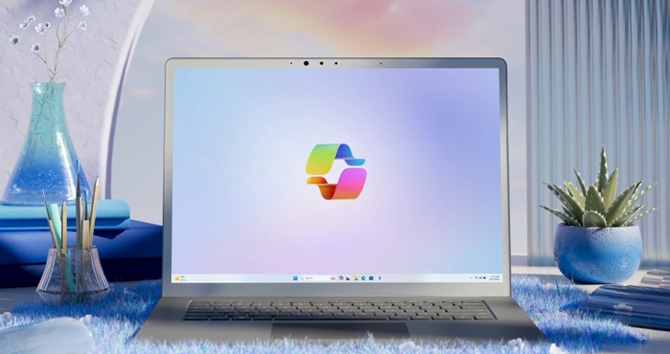If you've managed to avoid using (or being used by) artificial intelligence (AI) programs until now, that may soon be about to change. Today in New York City, Microsoft announced that its version of generative AI, called Copilot, will become a part of its Windows 11 operating system and an integral feature of popular programs like Word, PowerPoint, and its Edge web browser.

AI has become one of the most hyped and hated technologies to appear in years. The current crop of such programs are known as generative AI programs and are based on large language learning models that collect and analyze text from across the web. The programs then attempt to mimic human responses to questions and searches. The language technology has even been adapted to create pictures based on typed requests ("Create a picture of a snowman shoveling snow in a blizzard.") and analyze images to diagnose skin cancer.
The most well-known AI program, and the one used as a foundation for Microsoft's Copilot program, is OpenAI's ChatGPT. ChatGPT has been used to take SAT exams, write term papers, pass medical exams, and even create TV scripts. It has so captured the public imagination that, as of last month, it had received roughly 1.5 billion visits by users online. Indeed, it has proved so disruptive that it's even at the center of the months-long Hollywood writers' strike.
At the New York City event, Microsoft CEO Satya Nadella introduced the company's own version of ChatGPT called Copilot. Rather than acting as a standalone app, Microsoft plans to embed its Copilot into a welter of products. According to Nadella, Copilot will become "an everyday AI companion for you. You're going to see a lot of it."
Nadella said Copilot will do nothing less than "anticipate your needs," starting with an update to Windows 11 that will be available as of September 26. Then, the Copilot feature will begin appearing in programs like the Edge browser, Word, and Teams as it rolls out later this year in Microsoft 365 (business customers will see it first in November).
With the usual Utopian technology embellishments, Nadella touted the multiple benefits of AI, such as using it to plan a family vacation. For example, Nadella explained how Microsoft's search engine, Bing, would not only understand your flight preferences but also use past search results, chat sessions, and emails to determine your family's preferences and make sightseeing suggestions based on those results.
Overwhelmed by all those personal and work texts and the flood of emails? Nadella said all you'll have to do with Copilot is ask, "Hey, what happened this week?" to sort through all your emails, text messages, and news feeds at once.
One of the most disquieting applications of AI has been its ability to manipulate and create realistic photos and images. Microsoft will also include this AI skill in its Image Creator. Users can, for example, type "remove background," and Image Creator will make the edit automatically. Based on the DALL-E 3 model upgrade, the program will offer even more realistic images with better shadows and color gradations. And in a nod to concerns about disinformation and misinformation online, Microsoft said such images would all have embedded content credentials so that each image will be identified as being created using AI (the same feature is not available for text or articles created by AI, however).
Because Copilot will be embedded in the Windows operating system, it means the AI program will be able to see across all your stored files, apps, devices, and Web activity. That allows it to do things like find flight information that is stored on your phone and send it to your spouse's PC, summarize a lengthy email and send a copy of the abstract to your teammates, or recognize a complex equation and how it relates to a graph you cut and pasted (it will even explain how to solve the problem).
Many of Copilot's touted features are features of convenience, such as Bing offering better answers to questions (rather than a list of links), having Edge act as a personal shopper, or tailoring search results to your individual preferences. And Microsoft said you will be able to turn some of these AI features off.
But there is an overall creepiness factor to Copilot. For example, you can type up an ungrammatical, all-lower-case brain dump, and Copilot will create a blog post out of it in seconds (you can already try this with Bing Compose). Tired of replying to emails? Copilot will do it for you and even be able to use a new Sound Like Me feature that will purportedly personalize the email to, well, sound like you, right down to how you typically sign off on your emails.
How accurate all this will be remains to be seen. ChatGPT, for example, is notorious for being error-prone, citing false data, and even generating specious information that programmers call hallucinations. So what if Copilot becomes confused and sends your boss a message with kisses and hugs (rather than to your spouse)?
Microsoft CEO Nadella omitted these issues in his Copilot presentation. Instead, he emphasized the revolutionary upside of generative AI, calling it a "new phase in the development of the PC."
Indeed, the vision is that no matter what app you're using or where you are – at work, at home, or on the road – "copilot is always going be there to help you," he said.
While all these features are supposed to be benefits, they may sound frighteningly ominous to many users, especially given how many mistakes and pure fabrications chat AI programs make.
Nevertheless, AI is becoming inescapable. Last week, Google announced that it has already begun integrating its own generative AI program called Bard into programs like Google Docs, Gmail, and YouTube. And while Apple has fallen conspicuously behind in the race to adopt AI, it is reportedly working on its own large language model solutions. So even if you choose not to upgrade to the latest version of Microsoft's Windows 11 – and we recommend you wait at least a couple of weeks until the bugs are worked out – avoiding AI programs may soon become impossible.
(No AI programs were used in the creation of this article.)
[Image credits: Screenshots via Techlicious, Microsoft]
John R. Quain has been covering science and technology for over 20 years. His work has appeared in Rolling Stone, PC Magazine, Esquire, and U.S. News & World Report. He was the on-air technology contributor to the CBS News Up to the Minute television show for 17 years and is a regular contributor to The New York Times.













